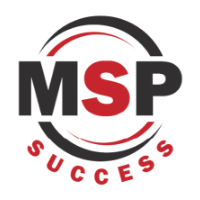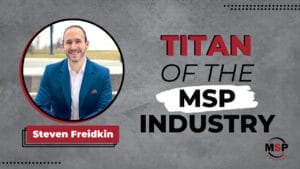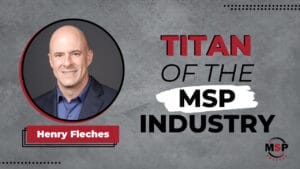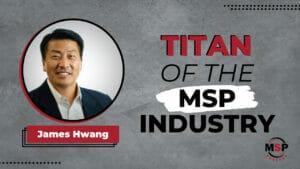The CEO of UDT learned from his immigrant parents that if you apply hard work to the opportunity at hand, you get results. He runs his company by the motto “Do the right thing and then do things right.“
Note: This article was taken from a live interview and has been edited for length and clarity.
Henry Fleches, CEO of United Data Technologies, received the inaugural Titan Of The Year award at Kaseya DattoCon 2023. Henry launched his company with business partner Gerard Amaro in 1995 in his parents’ home. Today, UDT has reached $425 million in revenue, primarily through organic growth, and is still privately owned, with no outside investors.
Robin Robins, founder of MSP Success Magazine, moderated a panel discussion with the Titans finalists at DattoCon and presented the Titan Of The Year award to UDT, which was voted the winner by attendees. In this interview, Robin talks with Henry about his journey as an entrepreneur, what life experiences have shaped his success and what advice he has for smaller MSPs seeking to grow their businesses.
Robin Robins, Founder, MSP Success and Big Red Media: Congratulations on the Titan Of The Year award! Please tell us a little about UDT.
Henry Fleches, CEO of UDT: We are embarking on our 30th year in business. Over time, we transitioned from a pure reseller to a value-added reseller to an IT solutions provider to a combination of things – MSSP, etc. – and now we are known as a technology solutions provider. Among those things, we have a fairly large, organically grown MSP business. We’re about 550 employees and we’ll do about $425 million in revenue this year. We predominantly focus on the SLED [state, local and education] business and on the commercial side, which is growing significantly; we predominantly support financial services, health care, energy, hospitality and professional services.
Robin: You and your business partner, Gerard Amaro, both immigrated to the United States. How did that experience help shape your success?
Henry: My parents are both Cuban. My partner’s parents are both Dominican. We met playing high school football and built a friendship that has spanned into our professional careers. When you see your family struggle – they basically had to leave their country and come to this country with nothing – then you have nothing but opportunity and hard work to be able to take advantage of. We saw that growing up. The family unit was important; the work ethic was extremely important. Doing the right thing and then doing things right was really important. When you’re provided an opportunity and you apply hard work to it, you typically get results.
My father had a small commercial kitchen equipment business that he bought from his employer. When he sold it, it was doing a million and a half in revenue after many, many years, but he grew it. He showed me what sacrifices were required to succeed. He’d come home for dinner, and then he’d have another job at night as a freelance electrician, and then on the weekends he’d have a third job. He and my mother focused on giving us an education and making sure we had the best opportunity to succeed.
Robin: How did you get your business up and running, and what was your path from hardware to services?
Henry: I got into tech because somebody told me I couldn’t do it, that I might break something. I was working for my father, so I became interested in understanding how not to break the technology. I started working part-time at Miami Dade College medical campus here in South Florida, and that’s where I got my roots in IT.
At the time we started UDT, the Internet was just starting, so not everybody had a website. On weekends we went into the lobbies of buildings and wrote down the names of all the businesses in the directory, found their phone numbers in the Yellow Pages and “dialed for dollars” on Monday. We never actually closed any of the businesses we called, but we got referrals.
Then those customers started referring us to customers in the SMB space. We were basically giving services away in order to sell hardware. That’s almost the inverse today. We got to $80 million as a reseller. It was slow, but over time we started focusing on customers that were financeable by banking institutions, and it just became easier for us to continue to borrow money and grow our credit capacity, and therefore the amount that we could sell customers.
We were on the road every day, knocking on doors, going after larger customers. It was a grind – there was no other way to say it.
A lot of organizations get as big as we are in a much faster time frame through M&A. We’ve done this organically, with the exception of one small acquisition we made back in 2017. For us, it’s been about getting it right from an organic sales perspective, and I think we’ve mastered that.
Robin: What are you doing differently from other MSPs or VARs that enabled you and your business partner to get to where you are?
Henry: There are a couple things we live by. Number one is the story of the lion and the deer: The deer wakes up running because he’s scared that he’s going to be eaten by the lion. The lion wakes up running because he’s hungry and wants to eat the deer. The moral of the story is, whether you’re the lion or the deer, you’ve got to wake up running and work hard.
The other thing we live by is that you’ve got to do the right thing and then do things right, in that order. We never sacrifice a customer over a transaction. It’s painful at times because you make some hard decisions, but they always turn out to be what’s in the best interests of a long-term relationship with the customer.
Third, as partners, we don’t keep score. Yes, we have metrics. Yes, we hold each other accountable. But at the end of the day, there’s no need for us to keep score of how much money he made or I made, or how much I spent or how much he spent, because you’re both moving toward a common goal. And that’s really been the success to our partnership.
Also, we saw the merger of IT operations and security very early on, so we effectively started delivering unified cyber risk management, unifying the components of people, process and technology and delivering that through a dashboard that could be measured. Say you follow a NIST framework, for example. Then you help a customer understand how to grade their cyber maturity and what they should do next based on the order of priority. That’s when you start delivering value.
Putting the security fingerprint on everything we did is probably one of the things that has allowed us to achieve the greatest amount of success fastest over the last two and a half years. Others are starting to be able to deliver on that, but we have what I’ll call “transitional advantages.” You’ve got to create transitional advantages along the way that’ll give you some separation between you and your competitors for a period of time, and typically that’s six to 18 months.
Robin: What lessons did you learn that could help others be successful?
Henry: The way I define success is not how many times I win, but how many times I get up. You’re going to make mistakes. You’re going to lose customers; you’re going to win some customers. You have to have grit, desire, passion and the willingness to learn.
We made some mistakes. I’m not trying to oversimplify it. Make sure you debate decisions furiously, you have some market data, you’ve done some analysis, because it’s not about your way, it’s about the right way.
Finally, when you’re starting early on, do what you’re best at and then hire somebody to do the stuff you’re not good at.
Robin: What advice would you have for the entrepreneur who is just feeling crushed because they’ve got so much on their plate?
Henry: It never goes away. You manage it by prioritizing. Pick a lane and focus on executing that, then focus on the next one. I’ll give you an example. Very early in my career, I walked into our first accountant’s office with this case full of papers – accounts payable, accounts receivable – and I was all flustered about getting this organized and what software I should use, etc. My accountant gave me this simple advice: put your invoices in the top drawer and your bills in the second drawer. Why? Because you need to make sure you collect the top drawer before you pay the second drawer. That’s your accounting system. What he meant was, don’t try to complicate things. Do what’s most important first.
Also, pick your battles professionally and focus on what you’re good at. Funnel that in a vertical or in a geography or in a segment where you can make an impact.
The basics are really about the fundamentals. You can’t win a football game unless you block and tackle. Sometimes small businesses get overwhelmed and forget that if they just block and tackle, that’s three-quarters of the battle.
Robin: Right now is a pretty good time to be an MSP. If you were a smaller MSP, what would you focus on in the next one to three years?
Henry: Labor shortages, cost of talent, turnover – we all deal with those challenges on a day-to-day basis. You’ve got to focus on automation. If you’re having a people problem, you’re going to need to rely on automation. There are tools from vendors like Kaseya that will allow you to drive some of that automation and fill in the gaps from a people perspective. The power of an integrated platform is significant because you can leverage those integration points instead of having to create or manage them.
And in the security space, I believe we’re headed toward integration. We have to be, because if you buy best of breed, then it’s up to the customer to drive the integration, and then that becomes their responsibility and their burden. Whereas if you go with an integrated stack, they have the power of integration.







